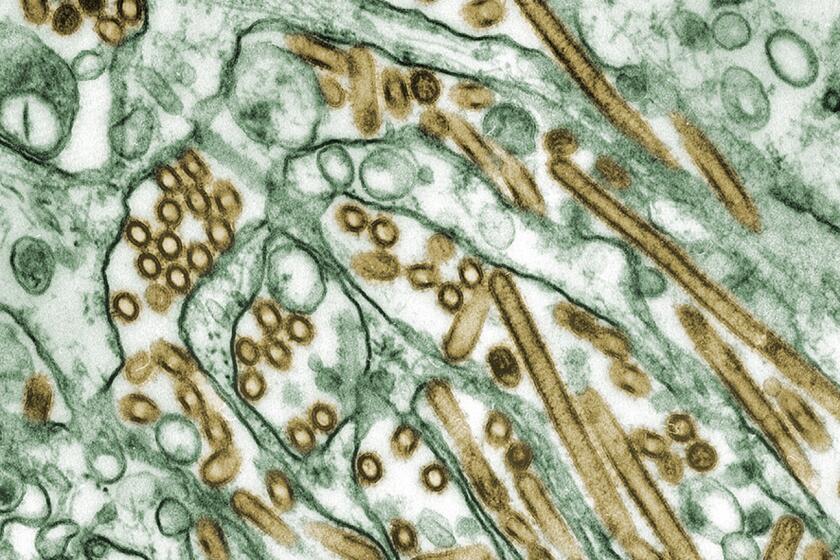Sighs and Sneezes : Allergies: When You Can’t Live With Pets and You Can’t Live Without Them
As subtly as the creep of little cat’s feet, allergies slip into our lives. After living harmoniously with pets for many years, it’s not uncommon for a person to suddenly start sneezing, wheezing or getting hives at the mere wag of a tail. It might begin with a slight runny nose that can be dismissed as “just a cold coming on.” But it can then become chronic and worsen to the point that medical help should be sought.
Allergies can take years to develop. The body’s tolerance to allergens, protein substances present in the air, on surfaces, in foods or on animals’ bodies, can simply wear out with aging. In an allergic individual, the body recognizes allergens as alien and responds by releasing antibodies. The interaction between the allergens and antibodies produces chemicals, called histamines, that can cause asthma, congestion, rashes or indigestion.
Studies show that vulnerability to allergies is an inherited biological trait that runs in families. But the susceptibility to a particular allergen is not: Even identical twins can have different reactions--one may get hives from eating shellfish, for instance, the other may start sneezing when a dog enters the room.
Some people who believe they are allergic to their pets may, in reality, be allergic to organisms that often surround pets. Before you zero in on the resident cat, dog or parakeet, suggests Palo Alto allergist Vincent Marinkovich, first check out food and water dishes, where allergy-producing molds often grow. Fungi or yeasts, such as Candida , that live parasitically on animals, and even insects such as fleas, can be allergens. Frequent and thorough washings may work to restore the pet and its owner to their former relationship. Even certain ingredients in pet food can cause reactions.
When the animal itself is the offender, it’s seldom the hair that is the culprit. In cats, the saliva with which they groom themselves, once it has dried, and dander, dead skin cells, are allergy-producing. Long- and short-hair varieties are equally problematic; all release these cells into the air. Yet with dogs, the short-hair breeds seem to provide less cover for harboring allergens and are easier to keep clean.
Bird allergies can be the most life threatening--and manifest the least obvious symptoms. Some years ago, English physicians diagnosed a debilitating lung condition among elderly pensioners who kept canaries. The allergen turned out to be in the droppings, which dried quickly and dispersed throughout rooms that were kept closed. The airborne particles caused pulmonary fibrosis, an irreversible deterioration of the lungs. In California, though, where windows are more often kept open, parakeets do not bring on the same consequences. But some pigeon breeders suffer a similar condition, for pigeons tend to be kept in enclosed structures.
Even small mammals such as rabbits, mice and hamsters are not trouble-free. For instance, rabbits and rodents used in medical research have proved a problem to their caretakers. Thomas Hamm, who is in charge of the research animals at Stanford University School of Medicine,says that allergic reactions in animal-care workers, even those who use masks, respirators and gloves, occur frequently in all animal facilities. Nor is it uncommon, he notes, for veterinarians to become allergic to their patients, be they cats and dogs, horses, rodents or birds.
In many homes, pet owners achieve a state of biological equilibrium with, or build up a tolerance to, their animals after living together for a long time. Only when they lose their sensitization--after a period of separation, say--do they suffer an acute allergic reaction. If the pet owner is lucky, the equilibrium will return after a relatively brief period of discomfort.
If it does not, or if symptoms are chronic, allergists can test the patient to pinpoint the specific causes of the allergy. Depending on the severity of the reactions, the patient can choose to use antihistamines, try a long series of inoculations or come to some sort of compromise with the pet. The last resort is to find a new home for the animal.
Most pet owners prefer living with some discomfort to living alone. It is often enough simply to exile a pet to certain rooms, or oblige it to live outdoors. The first step, physicians and vets agree, is to wash your hands every time you touch your pet and to stop sleeping with it. The allergic individual is courting disaster by sleeping in a cloud of alien allergens. (Even if allergies aren’t involved, pets harbor a multitude of viral agents that can cause illness in humans.)
Antihistamines are drugs that combat the histamines, the immune system’s reaction to the invasion; they do not attack the cause of the allergy. Taking these drugs is fine for a limited time, but a diet of antihistamines suppresses the body’s defenses and can weaken its ability to fight other foreign substances such as disease-causing viruses.
If the sufferer is allergic to only one breed of animal, then a series of shots of the same allergens that trigger the attacks may alleviate the symptoms. The idea is to coax the body into building up its own immunity. Most people, however, are allergic to a battery of allergens, and the shots may provide only limited relief.
The emotional stress of parting with pets can be as great a hardship as the physical discomforts of living with them. But when severe asthma or episodes of anaphylactic shock threaten, it is time to adjust to their absence. It is heartening to know that there is a breed of cat that many of the allergy-prone can tolerate. The Rex, a spontaneous mutation that has been bred to a distinctive line since 1950, looks and feels fleecy like a sheep. Anecdotal evidence suggests that the Rex, because it grooms itself less than other cats and has only a single layer of short, curly hair, provokes fewer allergic reactions.
The symbiotic relationship between humankind and their animals can be shattered by the sound of a cough. Did allergies exist in the Garden of Eden? When the lion lies down with the lamb will both sneeze? And still unknown is the degree to which some of our pets may be allergic to us.
More to Read
Start your day right
Sign up for Essential California for news, features and recommendations from the L.A. Times and beyond in your inbox six days a week.
You may occasionally receive promotional content from the Los Angeles Times.






